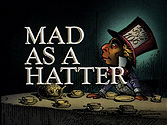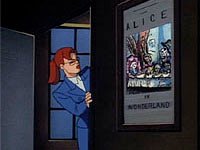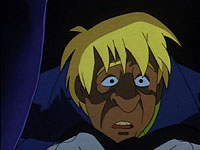|
||
|
| Credits | Cast | |
Written by Paul Dini Directed by Frank Paur Music by Shirley Walker Animation by Akom |
Kevin Conroy as Bruce Wayne Efrem Zimbalist, Jr. as Alfred Roddy McDowall as Jervis Tetch Steve Bulen as Police Dispatcher |
David Haskell as Billy Kimmy Robertson as Alice Loretta Swit as Dr. Cates |
|
It occurs right after the opening sequence, when Bruce Wayne and Dr. Cates visit poor Jervis Tetch in his Wayne Tech lab, and he sends them away empty-handed. Immediately after, Dr. Cates warns Tetch that he "got off easy" in refusing Wayne's inquiries. The "moment" occurs just between those two exchanges: After exiting, Dr. Cates leans through the door and in one smooth, unbroken movement looks around to stare, for a second only, at a poster on the nearby wall: a reproduction of Tenniel's famous illustration of the mad tea party in Alice in Wonderland. Only then does she turn and threaten Tetch. It's a seemingly throwaway moment, and yet it does so much. Most obviously, it serves a plot point: Later in the episode, Batman, examining the mind-control cards the Hatter is distributing, will look at a copy of Alice and remember seeing the same illustration on the wall of Tetch's office—the vital clue that will lead him to the mysterious "Hat." This would be just another instance of Batman's infallible leaps if it weren't for Dr. Cates' action: if this stupid and unimaginative woman will notice such a poster, surely Batman will. At a stroke, his deduction looks like something more plausible than a plot device. More subtly, it integrates characters and scenery. Too often in film—and television animation in particular—the background is only that: something behind or in back of the characters which they barely notice and hardly ever interact with. Watching the cast of Friends mug shamelessly in the foreground, I sometimes have the feeling that if the background slid away "Duck Amuck"-like, to be replaced by a barnyard, the tropics, or even a blank white space, the characters would carry on without registering the change. Because we're unaware of the posters' eventual import, Dr. Cates' action makes that office feel a little more real, because the decor has actually caught her attention. It also deepens Dr. Cates' character. Her fawning over "Bruce," and Tetch's and Alice's ill-disguised distaste, already mark her off at the start of the episode as an unpleasant character, and it's a judgment that her later behavior will only confirm. Indeed, of all the characters in the episode (emphatically including Tetch) she comes the closest to seeming the villain. And yet that one touch, of having her notice and take the time to look at a bit of art, is marvelously disarming. It makes her seem alert, perceptive, and alive to the world—admirable qualities all.
Tetch's story is the stuff either of soulless science-fiction or maudlin melodrama, genres that hollow out or abuse their characters. So Tetch has in his hands the technology of mind-control. Cue maniacal laughter as the puppetmaster pulls others' strings. (A temptation they eventually gave in to with "The Worry Men" and "Animal Act.") Or: Tetch is a lonely nerd incapable of expressing his unrequited love. Cue the bathetic monologues, to gratingly saw at the heartstrings. But Dini's script successfully avoids those traps, evoking but not exploiting the pain of romantic frustration and making the mind-control device a trap ultimately for the putative "mad scientist." Equally bewitching is McDowall's light but heart-wrenching performance as the Hatter, that gentle genius undone by loneliness. So we watch a character we cannot help but identify with—who among us has not similarly suffered the pangs of romantic self-doubt? That psychological familiarity makes us complicit as, step by step, Tetch surrenders to temptation, to frustration, to fear, and finally to anger and pride, as he tries to take by right and force what can only be accepted as an undeserved gift. In the end, our sympathy turns to despair rather than horror as the mind-control cards come out; we feel not the terror of the victim but the humiliation of the criminal as he is forced to make friends and lovers by making slaves. More so than "Harley and Ivy" or even "Heart of Ice," "Mad as a Hatter" shows off the series' gift for close observation and its capacity to make even the most outrageous antagonist feel very real. And how much deeper we recognize that commitment to a recognizable universe when we see that it does not even disdain the most marginal of its characters—someone like Dr. Cates. |
|
|
|
Related Episodes |
What Others Are Saying ... |
| Back to Lock-Up |
Forward to Make 'Em Laugh |


 "Mad
as a Hatter" contains my favorite moment in all of BTAS. It's an
eccentric choice for that honor—probably you've missed it, or thought
nothing of it. It's a very small thing, but for that very reason highly
emblematic of what BTAS gets so gloriously right.
"Mad
as a Hatter" contains my favorite moment in all of BTAS. It's an
eccentric choice for that honor—probably you've missed it, or thought
nothing of it. It's a very small thing, but for that very reason highly
emblematic of what BTAS gets so gloriously right. 